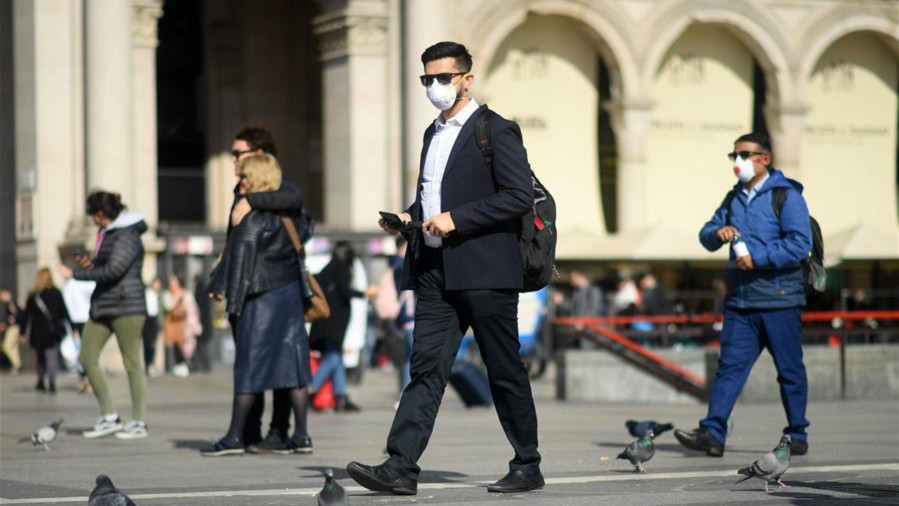
Editor's note: Lionel Vairon is the president of CEC Consulting company and a senior researcher at the Charhar Institute of international relations and public diplomacy in Beijing. He is a former journalist (1985-1989), former diplomat (1991-2002) successively posted in Cambodia, Thailand and Iraq by the French government. He is also an author of many books and papers about China's geopolitics, international relations and Arabo-Islamic world. The article reflects the author's opinions, and not necessarily the views of CGTN.
Last week, the coronavirus epidemic reached Europe, with steadily increasing casualties, at a time when it seems to have stabilized in China, most new identified cases being located in Hubei Province where the outbreak began.
China has been the focus of criticism by numerous media and European specialists, in respect to local authorities' management of the outburst of the virus, as well as the political "regime" and more specifically President Xi Jinping. In this regard, the city of Wuhan and the province of Hubei have indeed probably misjudged the situation.
However, the determination to maintain a certain level of discretion can be explained by the risks and potentially devastating effects of mass panic, which could not only have led to a much higher expansion rate of the virus, but also to an inability to set up timely quarantine measures.
Examples of the danger of mass panic can be found in Europe and the United States as scenes of people rushing to food and essential goods stores, as well as pillaging of shops were seen when exposed to certain threats such as natural catastrophes. One of the greater challenges when facing such situations is avoiding fake or incomplete news which contribute not only to creating panic, but also to amplifying it, a role currently being filled by Facebook and other social networks.
The reaction and behavior in Europe following the introduction of the epidemic has varied. Italy, the most affected country with 17 deaths at February 28, has chosen the same method as China, quarantining a dozen of cities in Lombardy and Venetia. France is second with two deaths, and Germany third with no deaths.
European health authorities are expecting exponential increase in cases, at different rates depending on the state and efficiency of health services. In France, this epidemic surfaces as the health care system is being questioned by practitioners, especially doctors, who have gone on strike by the hundreds. French officials, notably the new health minister, have tried reassuring public opinion and hospitals but the trust has clearly been broken between public authorities and the health sector.

People are seen wearing face masks as they walk in Milan, Italy, February 24, 2020. /Xinhua
People are seen wearing face masks as they walk in Milan, Italy, February 24, 2020. /Xinhua
Deficiencies of Chinese hospitals have often been denounced by French media over recent times, especially regarding the insufficient number of beds, interestingly forgetting that in French hospitals, waiting time in emergency rooms can sometimes last up to 24 hours. Promises made by the health minister regarding additional funds for public hospitals do not seem enough to appease medical personnel expecting a growing number of cases.
In Italy, the epidemic has been spreading at a very high rate. The Chinese community, between 22,000 and 35,000 people mainly working in the textile industry in Toscana, in the Prato region, which has been confronted to hardly hidden xenophobia for a long time, has decided to quarantine itself in order to avoid being accused of spreading the virus.
In most countries of the European Union, the fear of a fast-expanding epidemic is mitigated by the quality of health infrastructures, on condition that public authorities adopt extreme control and surveillance measures, most identified cases until now having been benign versions of the illness.
However, the WHO has elevated the international threat assessment to its highest level, especially for developing countries with insufficiently equipped and poorly performing medical facilities as well as high risk populations.
The economic impact of the epidemic will probably be felt progressively and might be significant if the epidemic is not quickly contained. In France, partial activity measures have been announced by the health ministry and teleworking and stoppage of work have been implemented in order to reduce risks while maintaining activities for companies. Several schools located in regions where the first cases have been identified have been closed, parents being allowed sick leaves with daily remuneration in order to tend to their children. Situation of companies will have to be closely monitored by the economy ministry, together with the G20 and the IMF.
At this early stage, it is, however, impossible to determine the possible consequences of the epidemic on European economies as the situation is not yet under control and the coronavirus is still in its expansion phase. European officials have taken advantage of this situation to question the relocation of companies in China, demanding that they bring some of their activities back to Europe, especially strategic productions, and encouraging them to reconsider their policy regarding production outside of Europe.
The epidemic seems timely for EU authorities with recent warnings to European leaders and public opinion regarding the economic risks of both relocation in China and growing arrival of Chinese companies in European markets.
(If you want to contribute and have specific expertise, please contact us at opinions@cgtn.com)